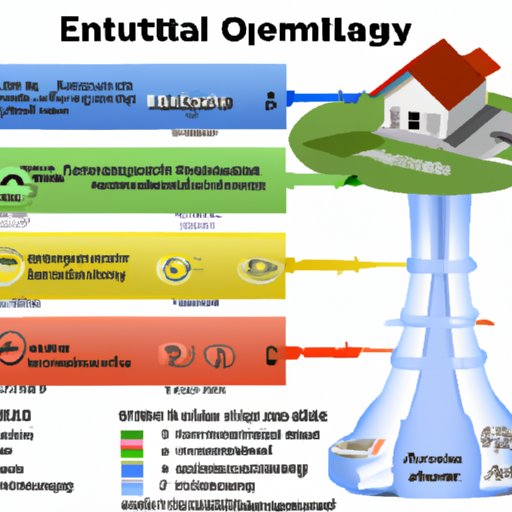Introduction
Geothermal systems are becoming increasingly popular among homeowners looking for energy-efficient and environmentally friendly heating and cooling solutions. But how much does a geothermal system cost? In this article, we’ll explore the average cost of installing a geothermal system, compare it to conventional heating and cooling systems, and discuss the potential financial and environmental benefits of investing in one.

A Guide to the Average Cost of Installing a Geothermal System
A lot of factors go into calculating the total cost of installing a geothermal system, but the main cost components include:
- Ground loop or ground source heat pump
- Distribution system (duct work, plenum, etc.)
- Installation labor
- Permits and fees
The size and complexity of the system, as well as the type of distribution system used, will all affect the total cost. On average, you can expect to pay between $20,000 and $30,000 for a complete geothermal system installation.
Geothermal System Installation: What You Need to Know About Costs
Before you begin the installation process, there are a few important things to consider. For example, you need to determine the size and layout of your home, as well as your existing heating and cooling needs. This will help you decide whether a geothermal system is the right choice for your home and budget.
It’s also important to find a qualified professional installer who has experience working with geothermal systems. The installation process requires specialized equipment, so it’s important to make sure the contractor you hire is experienced and knowledgeable about the process.
How Much Does It Cost to Install a Geothermal System?
The cost of installing a geothermal system depends on several factors, including the size and complexity of the system, as well as the type of distribution system used. Here are some of the most common factors that can affect the final cost:
- Size of the home
- Type of geothermal system
- Type of distribution system
- Location and access to the site
- Soil conditions
- Water availability
For an average-sized home, you can expect to pay anywhere from $20,000 to $30,000 for a complete geothermal system installation. This includes the cost of the ground loop or ground source heat pump, the distribution system, installation labor, and any permits and fees.
Pros and Cons of Investing in a Geothermal System – Cost Analysis Included
Investing in a geothermal system comes with many advantages, including lower energy bills, increased comfort, and improved air quality. Additionally, geothermal systems are more efficient than traditional heating and cooling systems, which means they require less energy to operate.
However, there are also some drawbacks to consider. For example, geothermal systems require a significant upfront investment, and they can be difficult and costly to install. Additionally, they aren’t always the best solution for every home, as they may not be suitable for homes with limited space or soil conditions that are not conducive to a geothermal system.
When it comes to cost, geothermal systems are typically more expensive to install than traditional heating and cooling systems. However, over time, the savings from lower energy bills can offset the initial investment. Additionally, many states offer incentives to homeowners who invest in energy-efficient systems, such as tax credits or rebates, which can reduce the cost of installation.
Geothermal System Cost: Is It Worth the Investment?
When deciding whether to invest in a geothermal system, it’s important to consider both the financial and environmental benefits. From a financial standpoint, geothermal systems can save homeowners money on their energy bills over time. Additionally, many states offer incentives to homeowners who invest in energy-efficient systems, such as tax credits or rebates, which can reduce the cost of installation.
From an environmental standpoint, geothermal systems are much more efficient than traditional heating and cooling systems. They require less energy to operate, which means fewer emissions and a smaller carbon footprint. Additionally, geothermal systems don’t use fossil fuels, which means they don’t contribute to air pollution.
Conclusion
Installing a geothermal system is a big investment, but it can provide substantial savings in the long run. Not only can you save money on your energy bills, but you can also enjoy the environmental benefits of a more efficient system. Before you decide whether a geothermal system is right for your home, make sure to weigh the pros and cons and calculate the estimated cost of installation. With the information provided in this article, you should be able to make an informed decision about whether a geothermal system is worth the investment.
(Note: Is this article not meeting your expectations? Do you have knowledge or insights to share? Unlock new opportunities and expand your reach by joining our authors team. Click Registration to join us and share your expertise with our readers.)
